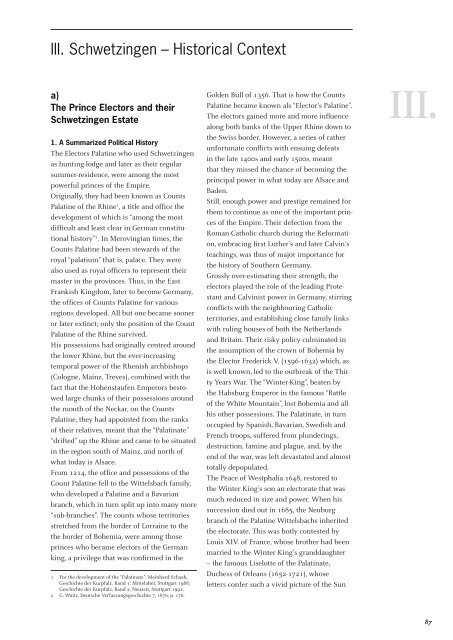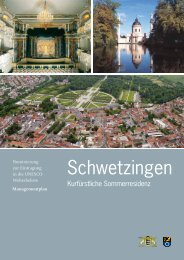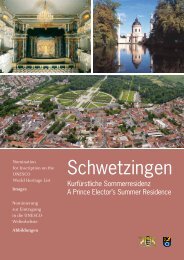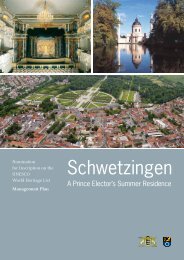II. - Schloss Schwetzingen
II. - Schloss Schwetzingen
II. - Schloss Schwetzingen
You also want an ePaper? Increase the reach of your titles
YUMPU automatically turns print PDFs into web optimized ePapers that Google loves.
<strong>II</strong>I. <strong>Schwetzingen</strong> – Historical Context<br />
a)<br />
The Prince Electors and their<br />
<strong>Schwetzingen</strong> Estate<br />
1. A Summarized Political History<br />
The Electors Palatine who used <strong>Schwetzingen</strong><br />
as hunting-lodge and later as their regular<br />
summer-residence, were among the most<br />
powerful princes of the Empire.<br />
Originally, they had been known as Counts<br />
Palatine of the Rhine 1 , a title and offi ce the<br />
development of which is “among the most<br />
diffi cult and least clear in German constitutional<br />
history” 2 . In Merovingian times, the<br />
Counts Palatine had been stewards of the<br />
royal “palatium” that is, palace. They were<br />
also used as royal offi cers to represent their<br />
master in the provinces. Thus, in the East<br />
Frankish Kingdom, later to become Germany,<br />
the offi ces of Counts Palatine for various<br />
regions developed. All but one became sooner<br />
or later extinct; only the position of the Count<br />
Palatine of the Rhine survived.<br />
His possessions had originally centred around<br />
the lower Rhine, but the ever-increasing<br />
temporal power of the Rhenish archbishops<br />
(Cologne, Mainz, Treves), combined with the<br />
fact that the Hohenstaufen Emperors bestowed<br />
large chunks of their possessions around<br />
the mouth of the Neckar, on the Counts<br />
Palatine, they had appointed from the ranks<br />
of their relatives, meant that the “Palatinate”<br />
“drifted” up the Rhine and came to be situated<br />
in the region south of Mainz, and north of<br />
what today is Alsace.<br />
From 1214, the offi ce and possessions of the<br />
Count Palatine fell to the Wittelsbach family,<br />
who developed a Palatine and a Bavarian<br />
branch, which in turn split up into many more<br />
“sub-branches”. The counts whose territories<br />
stretched from the border of Lorraine to the<br />
the border of Bohemia, were among those<br />
princes who became electors of the German<br />
king, a privilege that was confi rmed in the<br />
1 For the development of the “Palatinate”: Meinhard Schaab,<br />
Geschichte der Kurpfalz. Band 1: Mittelalter, Stuttgart 1988;<br />
Geschichte der Kurpfalz, Band 2: Neuzeit, Stuttgart 1992.<br />
2 G. Waitz, Deutsche Verfassungsgeschichte 7, 1876, p. 176.<br />
Golden Bull of 1356. That is how the Counts<br />
Palatine became known als “Elector’s Palatine”.<br />
The electors gained more and more infl uence<br />
along both banks of the Upper Rhine down to<br />
the Swiss border. However, a series of rather<br />
unfortunate confl icts with ensuing defeats<br />
in the late 1400s and early 1500s, meant<br />
that they missed the chance of becoming the<br />
principal power in what today are Alsace and<br />
Baden.<br />
Still, enough power and prestige remained for<br />
them to continue as one of the important princes<br />
of the Empire. Their defection from the<br />
Roman-Catholic church during the Reformation,<br />
embracing fi rst Luther’s and later Calvin’s<br />
teachings, was thus of major importance for<br />
the history of Southern Germany.<br />
Grossly over-estimating their strength, the<br />
electors played the role of the leading Protestant<br />
and Calvinist power in Germany, stirring<br />
confl icts with the neighbouring Catholic<br />
territories, and establishing close family links<br />
with ruling houses of both the Netherlands<br />
and Britain. Their risky policy culminated in<br />
the assumption of the crown of Bohemia by<br />
the Elector Frederick V. (1596-1632) which, as<br />
is well known, led to the outbreak of the Thirty<br />
Years War. The “Winter-King”, beaten by<br />
the Habsburg Emperor in the famous “Battle<br />
of the White Mountain”, lost Bohemia and all<br />
his other possessions. The Palatinate, in turn<br />
occupied by Spanish, Bavarian, Swedish and<br />
French troops, suffered from plunderings,<br />
destruction, famine and plague, and, by the<br />
end of the war, was left devastated and almost<br />
totally depopulated.<br />
The Peace of Westphalia 1648, restored to<br />
the Winter King’s son an electorate that was<br />
much reduced in size and power. When his<br />
succession died out in 1685, the Neuburg<br />
branch of the Palatine Wittelsbachs inherited<br />
the electorate. This was hotly contested by<br />
Louis XIV. of France, whose brother had been<br />
married to the Winter King’s granddaughter<br />
– the famous Liselotte of the Palatinate,<br />
Duchess of Orleans (1652-1721), whose<br />
letters confer such a vivid picture of the Sun<br />
<strong>II</strong>I.<br />
87






